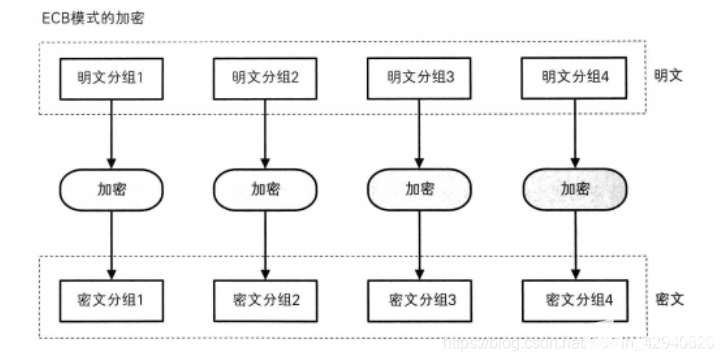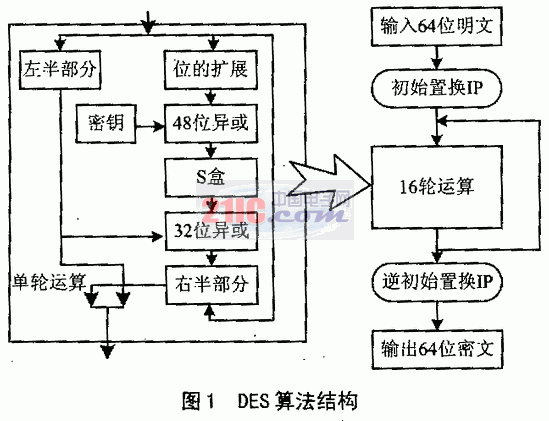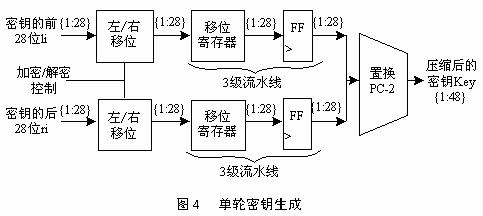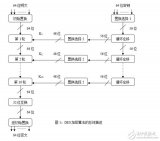【安全算法之DES】DES算法(支持ECB/CBC模式)的C語言源碼實現
- 概述
- 頭文件定義
- C語言版本的實現源碼
- 數據分組模式:ECB模式和CBC模式
- 測試用例
- github倉庫
- 更多參考鏈接
概述
大家都知道在安全領域,算法可謂是十分重要,而面對加密要求不算太高的場景,我們都可能會考慮使用對稱算法,而不是采用非對稱算法,主要是因為對稱算法相對簡單,計算復雜度較低。而作為比較前出現的對稱算法,DES算法在對稱算法領域一直占有很有重要的地位。
關于對稱算法和非對稱算法的區別,可以參考我之前的文章: 【安全算法之概述】一文帶你簡要了解常見常用的安全算法
今天給大家帶來DES算法的C源碼版本實現,本源碼支持ECB模式和CBC模式,歡迎大家深入學習和討論。
頭文件定義
頭文件定義如下,主要定義了DES運算的數據塊長度大小,以及3種可能的密鑰長度,還有導出的2個API,一個用于數據加密,一個用于數據解密:
#ifndef __DES_H__
#define __DES_H__
#ifdef __cplusplus
extern "C" {
#endif /* __cplusplus */
#include
#define DES_BLOCK_LEN 8 // 8bytes
#define DES_KEY_LEN_8 8 // key-length: 8bytes -> single DES
#define DES_KEY_LEN_16 16 // key-length: 16bytes -> triple DES (key1=key[0], key2=key[8], key3=key[0])
#define DES_KEY_LEN_24 24 // key-length: 24bytes -> triple DES (key1=key[0], key2=key[8], key3=key[16])
typedef enum _des_mode_e {
DES_MODE_ECB,
DES_MODE_CBC
} des_mode_e;
int32_t crypto_des_encrypt(const uint8_t *data, uint32_t data_len, uint8_t *out, const uint8_t *iv,
const uint8_t *key, uint32_t key_len, des_mode_e mode);
int32_t crypto_des_decrypt(const uint8_t *data, uint32_t data_len, uint8_t *out, const uint8_t *iv,
const uint8_t *key, uint32_t key_len, des_mode_e mode);
#ifdef __cplusplus
}
#endif /* __cplusplus */
#endif /*__DES_H__*/
C語言版本的實現源碼
下面是DES的C語言版本實現,主要也是圍繞導出的2個數據加解密API,其中數據的分組模式,支持ECB模式和CBC模式:
#include
#include
#include "des.h"
#define DES_TRUE 0x01
#define DES_FALSE 0x00
#define DES_DO_INITIAL_PERMUTATION 0x10
#define DES_ENCRYPTION_MODE 0x20
#define DES_DECRYPTION_MODE 0
#define DES_DO_FINAL_PERMUTATION 0x40
#define DES_ENCRYPT_BLOCK (DES_DO_INITIAL_PERMUTATION|DES_ENCRYPTION_MODE|DES_DO_FINAL_PERMUTATION)
#define DES_DECRYPT_BLOCK (DES_DO_INITIAL_PERMUTATION|DES_DECRYPTION_MODE|DES_DO_FINAL_PERMUTATION)
const uint8_t IPP[64] = {
57, 49, 41, 33, 25, 17, 9, 1, 59, 51, 43, 35, 27, 19, 11, 3,
61, 53, 45, 37, 29, 21, 13, 5, 63, 55, 47, 39, 31, 23, 15, 7,
56, 48, 40, 32, 24, 16, 8, 0, 58, 50, 42, 34, 26, 18, 10, 2,
60, 52, 44, 36, 28, 20, 12, 4, 62, 54, 46, 38, 30, 22, 14, 6
};
const uint8_t IPN[64] = {
39, 7, 47, 15, 55, 23, 63, 31, 38, 6, 46, 14, 54, 22, 62, 30,
37, 5, 45, 13, 53, 21, 61, 29, 36, 4, 44, 12, 52, 20, 60, 28,
35, 3, 43, 11, 51, 19, 59, 27, 34, 2, 42, 10, 50, 18, 58, 26,
33, 1, 41, 9, 49, 17, 57, 25, 32, 0, 40, 8, 48, 16, 56, 24
}; //Inverse permutation
const uint8_t Choose56[56] = {
56, 48, 40, 32, 24, 16, 8, 0, 57, 49, 41, 33, 25, 17, 9, 1,
58, 50, 42, 34, 26, 18, 10, 2, 59, 51, 43, 35, 62, 54, 46, 38,
30, 22, 14, 6, 61, 53, 45, 37, 29, 21, 13, 5, 60, 52, 44, 36,
28, 20, 12, 4, 27, 19, 11, 3
}; //Choosing the 56bit key from 64bit
const uint8_t key_round[32] = {
1, 1, 2, 2, 2, 2, 2, 2, 1, 2, 2, 2, 2, 2, 2, 1,
0, 1, 2, 2, 2, 2, 2, 2, 1, 2, 2, 2, 2, 2, 2, 1
}; //shift key left //shift key right
const uint8_t Choose48[48] = {
31, 0, 1, 2, 3, 4, 3, 4, 5, 6, 7, 8, 7, 8, 9, 10,
11, 12, 11, 12, 13, 14, 15, 16, 15, 16, 17, 18, 19, 20, 19, 20,
21, 22, 23, 24, 23, 24, 25, 26, 27, 28, 27, 28, 29, 30, 31, 0
}; //expands the right half text of 32 bits to 48 bits
const uint8_t E[48] = {
13, 16, 10, 23, 0, 4, 2, 27, 14, 5, 20, 9, 22, 18, 11, 3,
25, 7, 15, 6, 26, 19, 12, 1, 40, 51, 30, 36, 46, 54, 29, 39,
50, 44, 32, 47, 43, 48, 38, 55, 33, 52, 45, 41, 49, 35, 28, 31
}; //Compression and permutation for key
const uint8_t PP[32] = {
15, 6, 19, 20, 28, 11, 27, 16, 0 , 14, 22, 25, 4, 17, 30, 9,
1, 7, 23, 13, 31, 26, 2, 8, 18, 12, 29, 5, 21, 10, 3, 24
}; //P-box permutation
const uint8_t S[8][64] = {{
14, 4, 13, 1, 2, 15, 11, 8, 3, 10, 6, 12, 5, 9, 0, 7,
0, 15, 7, 4, 14, 2, 13, 1, 10, 6, 12, 11, 9, 5, 3, 8,
4, 1, 14, 8, 13, 6, 2, 11, 15, 12, 9, 7, 3, 10, 5, 0,
15, 12, 8, 2, 4, 9, 1, 7, 5, 11, 3, 14, 10, 0, 6, 13
},
{
15, 1, 8, 14, 6, 11, 3, 4, 9, 7, 2, 13, 12, 0, 5, 10,
3, 13, 4, 7, 15, 2, 8, 14, 12, 0, 1, 10, 6, 9, 11, 5,
0, 14, 7, 11, 10, 4, 13, 1, 5, 8, 12, 6, 9, 3, 2, 15,
13, 8, 10, 1, 3, 15, 4, 2, 11, 6, 7, 12, 0, 5, 14, 9
},
{
10, 0, 9, 14, 6, 3, 15, 5, 1, 13, 12, 7, 11, 4, 2, 8,
13, 7, 0, 9, 3, 4, 6, 10, 2, 8, 5, 14, 12, 11, 15, 1,
13, 6, 4, 9, 8, 15, 3, 0, 11, 1, 2, 12, 5, 10, 14, 7,
1, 10, 13, 0, 6, 9, 8, 7, 4, 15, 14, 3, 11, 5, 2, 12
},
{
7, 13, 14, 3, 0, 6, 9, 10, 1, 2, 8, 5, 11, 12, 4, 15,
13, 8, 11, 5, 6, 15, 0, 3, 4, 7, 2, 12, 1, 10, 14, 9,
10, 6, 9, 0, 12, 11, 7, 13, 15, 1, 3, 14, 5, 2, 8, 4,
3, 15, 0, 6, 10, 1, 13, 8, 9, 4, 5, 11, 12, 7, 2, 14
},
{
2, 12, 4, 1, 7, 10, 11, 6, 8, 5, 3, 15, 13, 0, 14, 9,
14, 11, 2, 12, 4, 7, 13, 1, 5, 0, 15, 10, 3, 9, 8, 6,
4, 2, 1, 11, 10, 13, 7, 8, 15, 9, 12, 5, 6, 3, 0, 14,
11, 8, 12, 7, 1, 14, 2, 13, 6, 15, 0, 9, 10, 4, 5, 3
},
{
12, 1, 10, 15, 9, 2, 6, 8, 0, 13, 3, 4, 14, 7, 5, 11,
10, 15, 4, 2, 7, 12, 9, 5, 6, 1, 13, 14, 0, 11, 3, 8,
9, 14, 15, 5, 2, 8, 12, 3, 7, 0, 4, 10, 1, 13, 11, 6,
4, 3, 2, 12, 9, 5, 15, 10, 11, 14, 1, 7, 6, 0, 8, 13
},
{
4, 11, 2, 14, 15, 0, 8, 13, 3, 12, 9, 7, 5, 10, 6, 1,
13, 0, 11, 7, 4, 9, 1, 10, 14, 3, 5, 12, 2, 15, 8, 6,
1, 4, 11, 13, 12, 3, 7, 14, 10, 15, 6, 8, 0, 5, 9, 2,
6, 11, 13, 8, 1, 4, 10, 7, 9, 5, 0, 15, 14, 2, 3, 12
},
{
13, 2, 8, 4, 6, 15, 11, 1, 10, 9, 3, 14, 5, 0, 12, 7,
1, 15, 13, 8, 10, 3, 7, 4, 12, 5, 6, 11, 0, 14, 9, 2,
7, 11, 4, 1, 9, 12, 14, 2, 0, 6, 10, 13, 15, 3, 5, 8,
2, 1, 14, 7, 4, 10, 8, 13, 15, 12, 9, 0, 3, 5, 6, 11
}
};
const uint8_t _bitposition[8] = {
0x80, 0x40, 0x20, 0x10, 0x08, 0x04, 0x02, 0x01
};
static void check_table(uint8_t line, uint8_t *text, uint8_t *lasttext, const uint8_t *IDD)
{
uint8_t i, j, k, temp, temp2;
for (j = 0, k = 0; j < line; j++, k += 8) {
lasttext[j] = 0;
for (i = 0; i < 8; i++) {
temp2 = IDD[k + i];
temp = text[temp2 / 8]; // get the byte
temp &= _bitposition[temp2 & 0x7]; // get the bit
if (temp) {
lasttext[j] |= _bitposition[i];
}
}
}
}
static void single_des_operation(uint8_t *plaintext, uint8_t *key, uint8_t mode)
{
static uint8_t prevtext[8];
uint8_t prevkey[8], Ltext[4], Rtext[4];
char temp, temp1;
int32_t i = 0;
int32_t Round = 0;
uint8_t j = 0;
if (mode & DES_DO_INITIAL_PERMUTATION) {
check_table(8, plaintext, prevtext, IPP); //Initial permutation
}
for (i = 0; i < 4; i++) {
Ltext[i] = prevtext[i];
Rtext[i] = prevtext[i + 4];
}
check_table(7, key, prevkey, Choose56);
for (Round = 0; Round < 16; Round++) {
//rotate both 28bits block to left(encrypt) or right(decrypt)
if (mode & DES_ENCRYPTION_MODE) { // encrypt
for (j = 0; j < key_round[Round]; j++) {
temp = prevkey[3] & 0x08;
for (i = 7; i > 0; i--) {
temp1 = prevkey[i - 1] & 0x80;
prevkey[i - 1] <<= 1;
if (temp) {
prevkey[i - 1] |= 0x01;
}
temp = temp1;
}
if (temp) {
prevkey[3] |= 0x10;
} else {
prevkey[3] &= 0xEF;
}
}
} else { // decrypt
for (j = 0; j < key_round[Round + 16]; j++) {
temp = prevkey[3] & 0x10;
for (i = 0; i < 7; i++) {
temp1 = prevkey[i] & 0x01;
prevkey[i] >>= 1;
if (temp) {
prevkey[i] |= 0x80;
}
temp = temp1;
}
if (temp) {
prevkey[3] |= 0x08;
} else {
prevkey[3] &= 0xF7;
}
}
}
check_table(6, prevkey, plaintext, E); //Compression permutation
check_table(6, Rtext, prevtext, Choose48); //Expansion permutation
//Expanded right half xor_operation with the subkey
prevtext[0] ^= plaintext[0];
prevtext[1] ^= plaintext[1];
prevtext[2] ^= plaintext[2];
prevtext[3] ^= plaintext[3];
prevtext[4] ^= plaintext[4];
prevtext[5] ^= plaintext[5];
for (j = 6, i = 8; j > 0; j -= 3, i -= 4) { //S-Box Substitution
plaintext[i - 1] = prevtext[j - 1];
plaintext[i - 2] = ((prevtext[j - 1] >> 6) & 0x03) | (prevtext[j - 2] << 2);
plaintext[i - 3] = ((prevtext[j - 2] >> 4) & 0x0f) | (prevtext[j - 3] << 4);
plaintext[i - 4] = prevtext[j - 3] >> 2;
}
for (i = 0; i < 8; i++) { //Get the S-Box location
temp = plaintext[i] & 0x21;
if (temp & 0x01) {
temp = (temp & 0x20) | 0x10;
}
plaintext[i] = temp | ((plaintext[i] >> 1) & 0x0F);
}
//Get S-Box output
plaintext[0] = S[0][plaintext[0]];
plaintext[1] = S[1][plaintext[1]];
plaintext[2] = S[2][plaintext[2]];
plaintext[3] = S[3][plaintext[3]];
plaintext[4] = S[4][plaintext[4]];
plaintext[5] = S[5][plaintext[5]];
plaintext[6] = S[6][plaintext[6]];
plaintext[7] = S[7][plaintext[7]];
//Combine 4-bit block to form 32-bit block
plaintext[0] = (plaintext[0] << 4) | plaintext[1];
plaintext[1] = (plaintext[2] << 4) | plaintext[3];
plaintext[2] = (plaintext[4] << 4) | plaintext[5];
plaintext[3] = (plaintext[6] << 4) | plaintext[7];
check_table(4, plaintext, prevtext, PP);
for (i = 0; i < 4; i++) {
prevtext[i] ^= Ltext[i];
Ltext[i] = Rtext[i];
Rtext[i] = prevtext[i];
}
}
for (i = 0; i < 4; i++) {
prevtext[i] = Rtext[i];
prevtext[i + 4] = Ltext[i];
}
if (mode & DES_DO_FINAL_PERMUTATION) {
check_table(8, prevtext, plaintext, IPN); //Final permutation
}
}
static int32_t xor_operation(uint8_t *out, const uint8_t *data1, const uint8_t *data2, uint32_t dwLen)
{
int32_t ret = DES_TRUE;
uint32_t i = 0;
if ((dwLen != 0) && ((data1 == NULL) || (data2 == NULL) || (out == NULL))) {
ret = DES_FALSE;
} else {
for (i = 0; i < dwLen; i++) {
out[i] = data1[i] ^ data2[i];
}
}
return ret;
}
int32_t crypto_des_encrypt(const uint8_t *data, uint32_t data_len, uint8_t *out, const uint8_t *iv,
const uint8_t *key, uint32_t key_len, des_mode_e mode)
{
uint32_t i = 0;
if ((data_len % DES_BLOCK_LEN != 0) || \
((key_len != DES_KEY_LEN_8) && \
(key_len != DES_KEY_LEN_16) && \
(key_len != DES_KEY_LEN_24))) {
return -1;
}
for (i = 0; i < data_len / DES_BLOCK_LEN; i++) {
if (mode == DES_MODE_CBC) {
if (i > 0) {
xor_operation(&out[i * DES_BLOCK_LEN], &data[i * DES_BLOCK_LEN], \
&out[(i - 1) * DES_BLOCK_LEN], DES_BLOCK_LEN);
} else {
xor_operation(&out[i], &data[i], iv, DES_BLOCK_LEN);
}
} else {
memcpy(&out[i * DES_BLOCK_LEN], &data[i * DES_BLOCK_LEN], DES_BLOCK_LEN);
}
if (key_len == DES_KEY_LEN_8) { //Single DES
single_des_operation(&out[i * DES_BLOCK_LEN], (uint8_t *)&key[0], DES_ENCRYPT_BLOCK);
} else { //Trip DES
uint8_t *key1 = (uint8_t *)&key[0];
uint8_t *key2 = (uint8_t *)&key[DES_KEY_LEN_8];
uint8_t *key3 = (uint8_t *)&key[0];
if (key_len == DES_KEY_LEN_24) {
key3 = (uint8_t *)&key[DES_KEY_LEN_16];
}
single_des_operation(&out[i * DES_BLOCK_LEN], key1, DES_ENCRYPT_BLOCK);
single_des_operation(&out[i * DES_BLOCK_LEN], key2, DES_DECRYPT_BLOCK);
single_des_operation(&out[i * DES_BLOCK_LEN], key3, DES_ENCRYPT_BLOCK);
}
}
return 0;
}
int32_t crypto_des_decrypt(const uint8_t *data, uint32_t data_len, uint8_t *out, const uint8_t *iv,
const uint8_t *key, uint32_t key_len, des_mode_e mode)
{
int32_t i = 0;
if ((data_len % DES_BLOCK_LEN != 0) || \
((key_len != DES_KEY_LEN_8) && \
(key_len != DES_KEY_LEN_16) && \
(key_len != DES_KEY_LEN_24))) {
return -1;
}
for (i = data_len / DES_BLOCK_LEN - 1; i >= 0; i--) {
memcpy(&out[i * DES_BLOCK_LEN], &data[i * DES_BLOCK_LEN], DES_BLOCK_LEN);
if (key_len == DES_KEY_LEN_8) { //Single DES
single_des_operation(&out[i * DES_BLOCK_LEN], (uint8_t *)&key[0], DES_DECRYPT_BLOCK);
} else { //Trip DES
uint8_t *key1 = (uint8_t *)&key[0];
uint8_t *key2 = (uint8_t *)&key[DES_KEY_LEN_8];
uint8_t *key3 = (uint8_t *)&key[0];
if (key_len == DES_KEY_LEN_24) {
key3 = (uint8_t *)&key[DES_KEY_LEN_16];
}
single_des_operation(&out[i * DES_BLOCK_LEN], key3, DES_DECRYPT_BLOCK);
single_des_operation(&out[i * DES_BLOCK_LEN], key2, DES_ENCRYPT_BLOCK);
single_des_operation(&out[i * DES_BLOCK_LEN], key1, DES_DECRYPT_BLOCK);
}
if (mode == DES_MODE_CBC) {
if (i > 0) {
xor_operation(&out[i * DES_BLOCK_LEN], &out[i * DES_BLOCK_LEN], \
&data[(i - 1) * DES_BLOCK_LEN], DES_BLOCK_LEN);
} else {
xor_operation(&out[i], &out[i], iv, DES_BLOCK_LEN);
}
}
}
return 0;
}
數據分組模式:ECB模式和CBC模式
找了2張相關的圖,描述得比較清晰,有助于大家理解:

簡單來說,ECB分組模式就把數據劃分為等長的數據塊,在DES運算里面,這個數據塊是8字節,然后對每個數據塊進行加密解密操作,最后將所有的結果再次按序拼接在一起;每個數據塊之間互不影響。

而CBC分組模式,它引入一個初始向量IV,它的運算流程如下:
加密流程
- 將原文數據劃分成N組等長的數據塊,在DES運算里面,這個數據塊是8字節;
- 將IV向量與第一組數據塊明文進行異或運算,然后把異或的結果傳入DES加密流程,得到第一組密文;
- 將第一組密文與第二組數據塊明文進行異或運算,然后把異或的結果傳入DES加密流程,得到第二組密文;
- 以此類推,直到完成所有數據塊的加密操作;
- 把所有的密文按照原來的順序拼接起來,得到輸出的密文。
解密流程
- 將密文數據劃分成N組等長的數據塊,在DES運算里面,這個數據塊是8字節;
- 一般從尾部數據塊開始解密,把最后一組密文數據塊傳入DES解密流程,得到明文數據塊后與倒數第二組密文數據塊做異或運算,得到最后一組數據的明文;
- 把倒數第二組密文數據塊傳入DES解密流程,得到明文數據塊后與倒數第三組密文數據塊做異或運算,得到倒數第二組數據的明文;
- 以此類推,直到完成所有數據塊的解密操作;
- 當解密完第一組數據密文后,要與初始向量IV做異或才得到第一組數據明文;
- 把所有的明文按照原來的順序拼接起來,得到輸出的明文。
CBC分組模式的一個特點就是,有IV向量的參與,不同的輸入IV會有不同的輸出結果,并且之間直接的數據塊是會有關聯的。
測試用例
針對DES導出的兩個加解密接口,以及ECB和CBC數組分組模式,我編寫了以下測試用例:
#include
#include
#include "des.h"
#include "convert.h"
int log_hexdump(const char *title, const unsigned char *data, int len)
{
char str[160], octet[10];
int ofs, i, k, d;
const unsigned char *buf = (const unsigned char *)data;
const char dimm[] = "+------------------------------------------------------------------------------+";
printf("%s (%d bytes):\r\n", title, len);
printf("%s\r\n", dimm);
printf("| Offset : 00 01 02 03 04 05 06 07 08 09 0A 0B 0C 0D 0E 0F 0123456789ABCDEF |\r\n");
printf("%s\r\n", dimm);
for (ofs = 0; ofs < (int)len; ofs += 16) {
d = snprintf( str, sizeof(str), "| %08X: ", ofs );
for (i = 0; i < 16; i++) {
if ((i + ofs) < (int)len) {
snprintf( octet, sizeof(octet), "%02X ", buf[ofs + i] );
} else {
snprintf( octet, sizeof(octet), " " );
}
d += snprintf( &str[d], sizeof(str) - d, "%s", octet );
}
d += snprintf( &str[d], sizeof(str) - d, " " );
k = d;
for (i = 0; i < 16; i++) {
if ((i + ofs) < (int)len) {
str[k++] = (0x20 <= (buf[ofs + i]) && (buf[ofs + i]) <= 0x7E) ? buf[ofs + i] : '.';
} else {
str[k++] = ' ';
}
}
str[k] = '\0';
printf("%s |\r\n", str);
}
printf("%s\r\n", dimm);
return 0;
}
typedef struct _des_test_data_t {
const char *name;
const char *data;
const char *cipher_exp;
const char *key;
const char *iv;
int mode;
} des_test_data_t;
static des_test_data_t g_des_test_data[] =
{
{
"DES_8-ECB-ENC-DEC",
"486328584376857876876876DFED458693696994369982784325876837265867",
"5D9D966FB7BD4C63C2452ADD63C75283D58253705EA8C9D2E2E69E4774C38DFF",
"C1D0F8FB4958670D",
"",
DES_MODE_ECB,
},
{
"DES_16-ECB-ENC-DEC",
"486328584376857876876876DFED458693696994369982784325876837265867",
"537B058DE0469097B657AB3639057FDE3A8AFF5D872BD02352C9785CCE9EDCA6",
"C1D0F8FB4958670DBA40AB1F3752EF0D",
"",
DES_MODE_ECB,
},
{
"DES_24-ECB-ENC-DEC",
"486328584376857876876876DFED458693696994369982784325876837265867",
"D7444666014085E167F20E9E6B592622CF74FB7C1F8AB3E05290C5AD81EA3140",
"C1D0F8FB4958670DBA40AB1F3752EF0D453D784F3784E389",
"",
DES_MODE_ECB,
},
{
"DES_8-CBC-ENC-DEC",
"486328584376857876876876DFED458693696994369982784325876837265867",
"799BFA00F4C3B2125DA1BA9185AB9B6C72940A92D7ABBDA1436F4C2C898B4D55",
"C1D0F8FB4958670D",
"876876DFED458693",
DES_MODE_CBC,
},
{
"DES_16-CBC-ENC-DEC",
"486328584376857876876876DFED458693696994369982784325876837265867",
"DE88B9AB8380320870E18130C306A2C953BAF27B2210EF0456B2CF90F6E2C1D3",
"C1D0F8FB4958670DBA40AB1F3752EF0D",
"876876DFED458693",
DES_MODE_CBC,
},
{
"DES_24-CBC-ENC-DEC",
"486328584376857876876876DFED458693696994369982784325876837265867",
"3788F49F44CFF611D1B638B0D0E71A2DB55304B3066EA2A5A864C7AC8FC111E5",
"C1D0F8FB4958670DBA40AB1F3752EF0D453D784F3784E389",
"876876DFED458693",
DES_MODE_CBC,
},
};
#define ARRAY_SIZE(n) (sizeof(n)/sizeof(n[0]))
static int des_test(des_test_data_t *data)
{
uint8_t data_hex[128];
uint16_t data_len;
uint8_t data_exp_hex[128];
uint16_t data_exp_len;
uint8_t key[24];
uint16_t key_len;
uint8_t iv[24];
uint16_t iv_len;
uint8_t data_calc[128];
uint8_t data_calc2[128];
int32_t ret;
utils_hex_string_2_bytes(data->data, data_hex, &data_len);
utils_hex_string_2_bytes(data->cipher_exp, data_exp_hex, &data_exp_len);
utils_hex_string_2_bytes(data->key, key, &key_len);
utils_hex_string_2_bytes(data->iv, iv, &iv_len);
ret = crypto_des_encrypt(data_hex, data_len, data_calc, iv, key, key_len, data->mode);
printf("DES encrypt ret: %d\n", ret);
log_hexdump("data_hex", data_hex, data_len);
log_hexdump("data_calc", data_calc, data_len);
log_hexdump("iv", iv, 8);
log_hexdump("key", key, key_len);
if (!memcmp(data_calc, data_exp_hex, data_len)) {
printf("DES encrypt [%s] OK !\n", data->name);
} else {
log_hexdump("data_exp_hex", data_exp_hex, data_len);
log_hexdump("data_calc", data_calc, data_len);
printf("DES encrypt [%s] FAIL !\n", data->name);
ret = -1;
goto exit_entry;
}
ret = crypto_des_decrypt(data_calc, data_len, data_calc2, iv, key, key_len, data->mode);
printf("DES decrypt ret: %d\n", ret);
log_hexdump("data_calc", data_calc, data_len);
log_hexdump("data_calc2", data_calc2, data_len);
log_hexdump("iv", iv, 8);
log_hexdump("key", key, key_len);
if (!memcmp(data_calc2, data_hex, data_len)) {
printf("DES decrypt [%s] OK !\n", data->name);
} else {
log_hexdump("data_hex", data_hex, data_len);
log_hexdump("data_calc2", data_calc2, data_len);
printf("DES decrypt [%s] FAIL !\n", data->name);
ret = -1;
goto exit_entry;
}
exit_entry:
return ret;
}
int main(int argc, const char *argv[])
{
int ret;
int i;
int cnt = ARRAY_SIZE(g_des_test_data);
for (i = 0; i < cnt; i++) {
ret = des_test(&g_des_test_data[i]);
if (ret < 0) {
break;
}
}
return 0;
}
測試用例比較簡單,分為6組測試場景,分別是:
“DES_8-ECB-ENC-DEC”,
“DES_16-ECB-ENC-DEC”,
“DES_24-ECB-ENC-DEC”,
“DES_8-CBC-ENC-DEC”,
“DES_16-CBC-ENC-DEC”,
“DES_24-CBC-ENC-DEC”,
數據的原文都是486328584376857876876876DFED458693696994369982784325876837265867但是使用不同的密鑰長度和不同的分組模式,得出的密文是不一樣的。
測試代碼中,提前預置好了期望的密文值,當計算結果與期望值一致時,表示計算成功,反之就計算失敗。
同時,也歡迎大家設計提供更多的測試案例代碼。
github倉庫
以上代碼和測試用例,及編譯運行等,可以參考我的github倉庫,有詳細的流程介紹,歡迎大家交流討論。如果有幫助到你的話,記得幫忙點亮一顆星哦。
更多參考鏈接
[1] 【安全算法的github倉庫】
[2] 【安全算法之概述】一文帶你簡要了解常見常用的安全算法
-
C語言
+關注
關注
180文章
7601瀏覽量
136251 -
DES
+關注
關注
0文章
64瀏覽量
48201 -
安全算法
+關注
關注
0文章
9瀏覽量
6100
發布評論請先 登錄
相關推薦
3-DES算法的FPGA高速實現

des算法原理
3DES算法的FPGA高速實現

des加密解密算法詳解及源碼分享

c語言實現des加密算法詳細過程





 【安全算法之DES】DES算法的C語言源碼實現
【安全算法之DES】DES算法的C語言源碼實現










評論